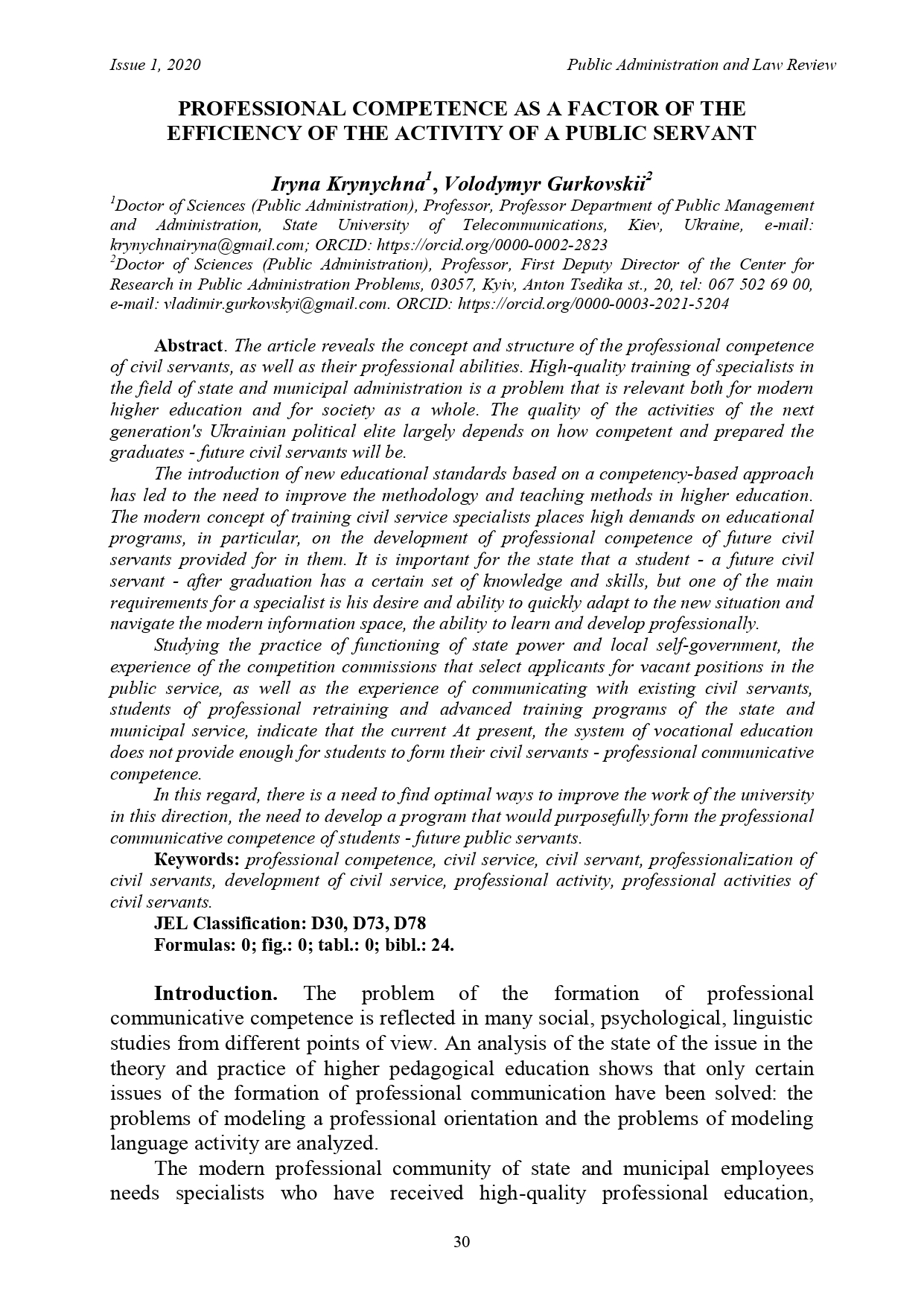PROFESSIONAL COMPETENCE AS A FACTOR OF THE EFFICIENCY OF THE ACTIVITY OF A PUBLIC SERVANT
DOI:
https://doi.org/10.36690/2674-5216-2020-1-30-38Keywords:
professional competence, civil service, civil servant, professionalization of civil servants, development of civil service, professional activity, professional activities of civil servantsAbstract
The article reveals the concept and structure of the professional competence of civil servants, as well as their professional abilities. High-quality training of specialists in the field of state and municipal administration is a problem that is relevant both for modern higher education and for society as a whole. The quality of the activities of the next generation's Ukrainian political elite largely depends on how competent and prepared the graduates - future civil servants will be.
The introduction of new educational standards based on a competency-based approach has led to the need to improve the methodology and teaching methods in higher education. The modern concept of training civil service specialists places high demands on educational programs, in particular, on the development of professional competence of future civil servants provided for in them. It is important for the state that a student - a future civil servant - after graduation has a certain set of knowledge and skills, but one of the main requirements for a specialist is his desire and ability to quickly adapt to the new situation and navigate the modern information space, the ability to learn and develop professionally.
Studying the practice of functioning of state power and local self-government, the experience of the competition commissions that select applicants for vacant positions in the public service, as well as the experience of communicating with existing civil servants, students of professional retraining and advanced training programs of the state and municipal service, indicate that the current At present, the system of vocational education does not provide enough for students to form their civil servants - professional communicative competence.
In this regard, there is a need to find optimal ways to improve the work of the university in this direction, the need to develop a program that would purposefully form the professional communicative competence of students - future public servants.
Downloads
References
Lipovskaya, N.A. (2015), "System-generated service: theoretical approaches", [Online], available at: http://dridu.dp.ua/konf/konf_dridu/dums_konf_ 2015 /pdf/510.pdf (Accessed 19 Jan 2020).
Akimov, O.O. (2014), "Psychological aspects of corruption in public administration", Derzhavne upravlinnia: teoriia ta praktyka, [Online], vol. 1, pp. 181-188, available at: http://nbuv.gov.ua/UJRN/Dutp_2014_1_23 (Accessed 19 Jan 2020).
Karpa, M.I. (2014), "Functional Approach to the Concept of Positions of the Civil Service", Efficiency of State Management (text): Zb.nauk. LEADU NADU under the President of Ukraine, Vol. 40. pp. 432–440.
Pluscch, R.M. (2016), Mistseve samovriaduvannia v umovakh detsentralizatsii vlady v Ukraini [Local self-government in the conditions of decentralization of power in Ukraine], RIDNA MOVA, Kyiv, Ukraine.
Soroko, V. M. (2009), Kadrova polityka i derzhavna sluzhba: konspekt lektsii [Personnel policy and public service: lecture notes], NADU, Kyiv, Ukraine.
Obolenskyi, O. Yu.(2006), Derzhavna sluzhba [Public service], KNEU, Kyiv, Ukraine.
Kivalov, S. V. and Bila, S.V. (2002), Orhanizatsiia derzhavnoi sluzhby v Ukraini [Organization of the civil service in Ukraine], Yurydychna literatura, Odesa, Ukraine.
Shpektorenko, I.V. (2009), Profesiina mobilnist derzhavnoho sluzhbovtsia [Professional mobility of a civil servant], Monolyt, Dnipro, Ukraine.
Yarmystyi, M.V. (2020), "Professional and social competence of civil servants", available at: http://cppk.cv.ua/122.php (Accessed 19 Jan 2020).
Pashko, L.A. (2005), Liudski resursy u sferi derzhavnoho upravlinnia: teoretyko-metodolohichni zasady otsiniuvannia [Human resources in public administration: theoretical and methodological principles of evaluation], Vyd-vo NADU, Kyiv, Ukraine.
Akimov, O. (2018), "The concept of the system genesis of the professional activities of public servants", Investytsiyi: praktyka ta dosvid, vol. 23, pp. 133–138.
Akimov, O. (2018), "Functional factors of the system genesis of the professional activities of civil servants", Investytsiyi: praktyka ta dosvid, vol. 24, pp. 68–74.
Akimov, O. (2019), "The robustness of the system of professional activity of public employees: systemogenescial context", Investytsiyi: praktyka ta dosvid, vol. 5, pp. 104–109.
Akimov, O., Karpa, M., Parkhomenko-Kutsevil, O., Kupriichuk, V., & Omarov, A. (2020). Entrepreneurship education of the formation of the e-commerce managers professional qualities. Journal of Entrepreneurship Education, 23 (S1).
Oluiko, V.M. (2004), "State service as a mechanism of public administration in civil society", Upravlinnia suchasnym mistom, vol. 7–9 (15), pp. 64–70.
Bashtannyk, A.H. and Bashtannyk, V.V. (2012), "Organizational bases of formation of integrated systems of public management in the context of the European integration process", Naukovyi visnyk Akademii munitsypalnoho upravlinnia, vol. 4, pp. 15–26.
Bashtannyk, V. (2010), Transformatsiia derzhavnoho upravlinnia v konteksti yevropeiskykh intehratsiinykh protsesiv [Transformation of Public Administration in the Context of European Integration Processes], DRIDU NADU, Dnipro, Ukraine.
Lypovska, N.A. (2011), "Interpretation of the concept of "public service": methodological controversy", Derzh. upr. ta mists. Samovriaduvannia, vol. 3 (10), available at: http://archive.nbuv.gov.ua/portal/soc_gum /Dums/2011_3/11lnasmp.pdf (Accessed 19 Jan 2020).
Serohin, S.M. (2003), Derzhavnyi sluzhbovets u vidnosynakh mizh vladoiu i suspilstvom [Civil servant in relations between government and society], DRIDU NADU, Dnipro, Ukraine.
Surai, I.H.(2012), Formuvannia ta rozvytok elity v derzhavnomu upravlinni: istoriia, metodolohiia, praktyka [Design and development of the elite in public administration: history, methodology, practice], TsP "KOMPRYNT", Kyiv, Ukraine.
Korneshchuk, V.V. and Yavorskyi, S. Kh. (2003), "The problem of readiness for professional activity in modern research", Nauka i osvita, vol. 1, pp. 21–24.
Linenko, A.F. (1998), "Professional activity and readiness for it", Visnyk Odeskoho instytutu vnutrishnikh sprav, vol.2, pp. 168–170.
Dukhnevych, V.M. (2002), "Psychological well-being of a professional as a condition of his effective activity", Ph.D. Thesis, Psychology, Kyiv, Ukraine.
Fedoryshyn, B.O. (1996), "Psychological and pedagogical bases of professional orientation", Ph.D. Thesis, Pedagogy, Kyiv, Ukraine.

Downloads
Published
How to Cite
Issue
Section
License
Copyright (c) 2020 Scientific Center of Innovative Researches OÜ

This work is licensed under a Creative Commons Attribution 4.0 International License.





